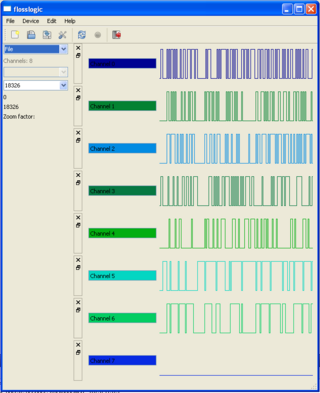Windows
This page describes how to build sigrok on Windows.
Building and installing the requirements
TortoiseGit
For checking out the sigrok source code you can use TortoiseGit on Windows.
- Download and install the latest version (for 32bit or 64bit Windows) of TortoiseGit (just double-click the *.msi installer).
- Download and install the latest version of the "full installer" of MSysGit (double-click the *.exe installer).
Mingw/MSYS
In order to build sigrok and various of its dependencies, we need a UNIX-like environment on Windows, which is provided by MinGW/MSYS.
- Download the latest version (20101030 currently) of the automated MinGW installer named mingw-get-inst (double-click the installer *.exe, which will download and install all components).
- Make sure you enable "C++ compiler", and "MinGW Developer Toolkit" in the installer.
- For simplicity it's recommended to leave the default install location of c:\MinGW unchanged.
autotools
Open a MinGW shell via Start/Programs/MinGW/MinGW Shell and do the following:
$ mingw-get update $ mingw-get install msys-wget msys-unzip autoconf automake libtool
libglib
sigrok also needs libglib >= 2.0 (but not Gtk+), which in turn needs pkg-config and libintl. Download the latest versions of the respective Windows binaries and extract them into c:\MinGW\msys\1.0:
- glib_2.22.5-1_win32.zip
- glib-dev_2.22.5-1_win32.zip
- pkg-config_0.23-3_win32.zip
- pkg-config-dev_0.23-3_win32.zip
- proxy-libintl-dev_20080918_win32.zip
libusb 1.0
$ git clone git://git.libusb.org/libusb-pbatard.git (or use TortoiseGit) $ cd libusb-pbatard $ ./autogen.sh $ make $ make install
libzip
Finally, we also need libzip.
First, install its dependency MinGW/zlib:
$ mingw-get install zlib msys-zlib-dev
Then, download libzip-0.9.3.tar.gz and extract it in c:\MinGW\msys\1.0.
$ cd /c/MinGW/msys/1.0 $ wget http://nih.at/libzip/libzip-0.9.3.tar.gz $ tar xfvz libzip-0.9.3.tar.gz $ cd libzip-0.9.3 $ autoreconf -i $ ./configure --with-zlib=/c/MinGW/msys/1.0 $ make $ make install
Python
We also need Python >= 2.5 for running the sigrok protocol decoders which are written in Python.
- Download and install the latest version (currently 2.6) of the Python Windows installer (just double-click the *.msi installer file).
- For simplicity it's recommended to leave the default install location of c:\Python26 unchanged.
Qt
In order to also build sigrok-gui, download the latest version (>= 4.5) of the Qt SDK for Windows (LGPL version) and double-click the installer. The download includes the Qt libraries, Qt Creator, Qt Designer, and various other Qt development tools.
Building sigrok
Get the source code:
$ git clone git://sigrok.git.sourceforge.net/gitroot/sigrok/sigrok (or use TortoiseGit) $ cd sigrok
Build the library and command line tool:
$ PKG_CONFIG_PATH=/usr/local/lib/pkgconfig ./autogen.sh $ PKG_CONFIG_PATH=/usr/local/lib/pkgconfig ./configure $ make $ make install
Build the GUI:
- First, you need to copy some files into the gui/debug folder:
$ cd gui $ PKG_CONFIG_PATH=/usr/local/lib/pkgconfig /c/Qt/2010.01/qt/bin/qmake $ cd debug $ cp /c/Qt/2010.01/qt/bin/libgcc_s_dw2-1.dll . $ cp /c/Qt/2010.01/qt/bin/QtCored4.dll . $ cp /c/Qt/2010.01/qt/bin/QtGui4.dll . $ cd ../..
- Then, open the project in Qt Creator from within an MSYS shell:
$ cd gui $ PKG_CONFIG_PATH=/usr/local/lib/pkgconfig /c/Qt/2010.01/qt/bin/qtcreator sigrok-gui.pro
- Build and run the project.
